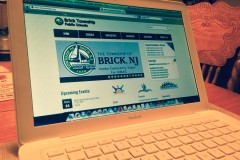A policy up for a vote later this week by the Brick Township Board of Education would ban Brick schoolteachers from “friending” students online, as well as prohibit them from interacting with them online except where permitted by the superintendent of schools.
The draft policy, which is up for a vote this Thursday, was the subject of an hours-long discussion by board members in October. During the discussion, the board members debated each other as to how far the policy should go, with some board members favoring a strict approach that they say sets stated guidelines to protect both teachers and students, and others saying teachers should be trusted to make their own decisions on what is appropriate.
In the end, the board members seemed to reach a consensus that some activities should be prohibited, but there should be room for exceptions, such as teachers whose family members are students, or teaches and coaches who need to communicate with students regarding after-school activities.
|
|
The policy, which was introduced last summer and heavily edited, will come up for a final vote Thursday.
Among its chief mandates, the policy:
• Requires that teachers do not use school computer networks for illegal activities, such as copyright infringement, forgery, invading the privacy of others, accessing records which they are not authorized to see, or posting anonymously on websites.
• Requires teachers to e-mail students only through a district e-mail account, which can be monitored by supervisors. Teachers would not be allowed to e-mail students from their personal addresses, and if a student e-mails a teacher at his or her personal address, the teacher would be required to respond from a district address and inform the student that personal e-mails should not be used.
• Prohibits teachers from calling students’ cell phones unless an authorization form allowing the practice has been signed by a student’s parent or guardian and is on file with the district. Teachers are required to limit their conversations to school business only, which is defined as answering questions about assignments and homework, scheduling appointments, clarifying classroom expectations or assignments, and notifying students of deadlines, sports schedules, class trips and other such events. Cell phone contact should be as “brief and direct” as possible.
• Prohibits teachers from sending text messages to students that are outside of class or extracurricular activity business. A signed form from a parent of guardian must be on-hand allowing the communication.
• Prohibits teachers from “improper fraternization” with students over social media. Teachers would be barred from “friending” or communicating in any way with current students over social media unless authorized specifically by the superintendent or if the student is a relative and a form is on file authorizing communication. Teachers, in training sessions, will be reminded to avoid posting content of a sexual nature to social media sites, or items that are considered to be “exhibiting or advocating the use of drugs and alcohol.”
• Instructs the superintendent to periodically conduct Internet searches to see if teachers have posted inappropriate material online. If such content is found, the superintendent must download the material and bring it to the BOE’s personnel committee for review.
[divider]Read the proposed policy in full: Draft Policy on Electronic Communication
[divider]Teachers who violate the policy, the draft proposal states, would be subject to a variety of penalties ranging from loss of network privileges to suspension or dismissal from their jobs. Illegal activities would be referred to authorities for potential prosecution.
Board member Karyn Cusanelli said at the October meeting that the policy is aimed at protecting both teachers and students by having monitoring in place so communication can be controlled and reviewed.
“If, God forbid, a teacher is accused, we need to be able to go in and either find out what happened or see that it didn’t happen,” said Cusanelli. “We’re putting this together in a way that protects the staff and students. If it saves one child from being victimized or one teacher from being falsely accused, it’s worth it, and that’s where I’m coming from with this.”
Michael Conti, another board member, took a different opinion at the meeting.
“I don’t like the impression it gives to our staff, that we’re not trusting them to act appropriately with our students,” said he said, of formally disallowing communication over social media between students and staff. “I think we should extend professional courtesy to our staff of knowing what the limits are.”
The district is currently pursuing implementing a number of software programs, such as Microsoft SharePoint, which will allow teachers and students to interact online in a more controlled environment, on district servers. The policy will likely change once that software is available for use, school officials have said.

Advertisement

Police, Fire & Courts
Teacher From Brick, 36, Charged With Carrying on Affair With Student
Brick Life
Adult Autism Transition

Police, Fire & Courts
Teacher From Brick Charged in Another Sex Affair With Student









